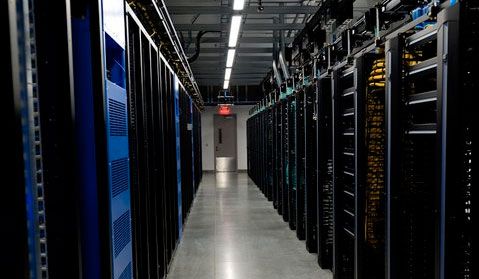
CPI's Evolution™ Cable Managers are shown on the right side of this aisle at
the Prineville Data Center. Go to Facebook's fan page for more photos.
First thing's first - from all indications (and there's been plenty), Facebook's latest (and first-ever custom built) data center in Prineville, Oregon does not use curtains for thermal containment. As you might expect, they've spared no short-term expense in building an installation that actively works towards lowering long-term cost. When your company's recently been valued at upwards of $50 billion, it's an easy investment.
Of course, with the rollout of the Open Compute Project, announced in tandem with Facebook's open-door policy on the Prineville data center specs and its many green initiatives (solar panels, use of outside fresh air to cool servers), the social media giant's approach to shared knowledge is no doubt admirable. But is it practical?
With so many factors to take into consideration when building or updating a space, such as location, environmental conditions, resources and more, it's not immediately apparent to see how much of an impact the Open Compute Project will have on the data center industry at large. What works in Prineville, Oregon may not make sense to a data center in New York or Florida during hot summer months.
While the industry continues to process the impressive amount of information that Facebook has provided with this announcement, it's equally as important to trust in the many ways in which you can reduce your carbon footprint, lower your energy costs and optimize your space (no matter how small) in the here and now.
Here at CPI, we offer proven solutions that create higher cooling efficiencies, recently highlighted at Orlando Health, a major healthcare provider in Florida. They took an existing space and optimized it with a variety of CPI products to achieve 30% savings in cooling efficiency. While Facebook's announcement presents us with but one vision of a data center of tomorrow, the energy efficiency achieved by Orlando Health represents what many of us are capable of doing today. Jeff Cihocki, eContent Specialist